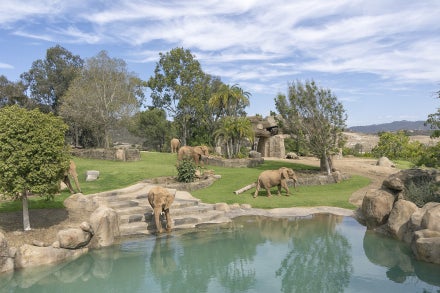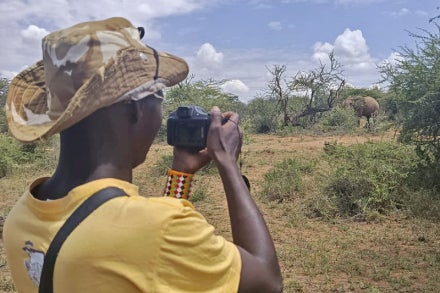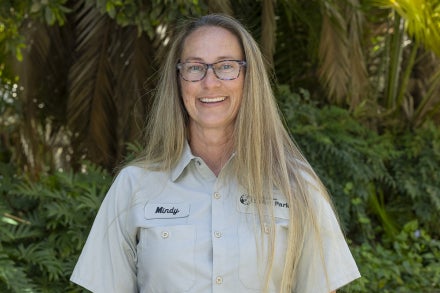
Over the past few years, northern Kenya experienced one of the worst droughts on record. As a result, people, livestock, and wildlife suffered greatly. Resources scarce and water limited, giraffe populations were in distress. Sadly, many lactating mothers were forced to abandon their offspring leaving young giraffe calves orphaned and fighting to survive.
Speeding to the rescue, the impromptu orphanage at the Sarara Camp stables that saved Mara the giraffe (click here to read her story), sprang into action yet again, this time opening the stables to not one but three giraffe calves all coming from various areas within Namunyak Conservancy: Lekiji, Reteti, and Fupi.
[caption id="attachment_127620" align="aligncenter" width="768"] Jesus, a research assistant with the Namunyak Twig Walinzi team, greets Lekiji. (Photo: Twiga Walinzi)[/caption]
A group of young boys found Lekiji wandering alone after his mother mother’s milk supply was exhausted and she was forced to abandon him. The young boys immediately alerted the Twiga Walinzi team based in Namunyak Conservancy who were able to work with the conservancy ranger teams to bring Lekiji to safety at the Sarara stables.
Similar to Lekiji, Reteti was rescued thanks to fast-acting community members who alerted the Twiga Walinzi about a young weak giraffe calf wandering alone near the Reteti Elephant Sanctuary. Rushing to aid the young giraffe, teams stepped in and brought the calf to Sarara.
Lekiji and Reteti were joined at the Sarara stables by Fupi, a calf granted a second chance and named after his small (for a giraffe) stature—fupi means “short” or “low” in Swahili.
Thanks to the decisive action of the community members who reported the orphans, and the quick response of the Twiga Walinzi and the Namunyak ranger teams, the three orphans found a safe haven at Sarara. Lekiji, Retei, and Fupi could have been just three more victims to drought; however, these calves now roam the vast Namunyak Conservancy healthy and almost fully grown. These animals are wonderful ambassadors that highlight community-led conservancies as drivers of wildlife conservation.
To help preserve the future for Lekiji, Reteti, and Fupi and all of their herdmates, visit WildwatchKenya.org to see how you can take action and become a part of the Twiga Walinzi research team. All it takes is just a few clicks.
Jenna Stacy-Dawes is a research coordinator for San Diego Zoo Global. Read her previous story, Marvelous Miss Mara.
Jesus, a research assistant with the Namunyak Twig Walinzi team, greets Lekiji. (Photo: Twiga Walinzi)[/caption]
A group of young boys found Lekiji wandering alone after his mother mother’s milk supply was exhausted and she was forced to abandon him. The young boys immediately alerted the Twiga Walinzi team based in Namunyak Conservancy who were able to work with the conservancy ranger teams to bring Lekiji to safety at the Sarara stables.
Similar to Lekiji, Reteti was rescued thanks to fast-acting community members who alerted the Twiga Walinzi about a young weak giraffe calf wandering alone near the Reteti Elephant Sanctuary. Rushing to aid the young giraffe, teams stepped in and brought the calf to Sarara.
Lekiji and Reteti were joined at the Sarara stables by Fupi, a calf granted a second chance and named after his small (for a giraffe) stature—fupi means “short” or “low” in Swahili.
Thanks to the decisive action of the community members who reported the orphans, and the quick response of the Twiga Walinzi and the Namunyak ranger teams, the three orphans found a safe haven at Sarara. Lekiji, Retei, and Fupi could have been just three more victims to drought; however, these calves now roam the vast Namunyak Conservancy healthy and almost fully grown. These animals are wonderful ambassadors that highlight community-led conservancies as drivers of wildlife conservation.
To help preserve the future for Lekiji, Reteti, and Fupi and all of their herdmates, visit WildwatchKenya.org to see how you can take action and become a part of the Twiga Walinzi research team. All it takes is just a few clicks.
Jenna Stacy-Dawes is a research coordinator for San Diego Zoo Global. Read her previous story, Marvelous Miss Mara.
 Jesus, a research assistant with the Namunyak Twig Walinzi team, greets Lekiji. (Photo: Twiga Walinzi)[/caption]
A group of young boys found Lekiji wandering alone after his mother mother’s milk supply was exhausted and she was forced to abandon him. The young boys immediately alerted the Twiga Walinzi team based in Namunyak Conservancy who were able to work with the conservancy ranger teams to bring Lekiji to safety at the Sarara stables.
Similar to Lekiji, Reteti was rescued thanks to fast-acting community members who alerted the Twiga Walinzi about a young weak giraffe calf wandering alone near the Reteti Elephant Sanctuary. Rushing to aid the young giraffe, teams stepped in and brought the calf to Sarara.
Lekiji and Reteti were joined at the Sarara stables by Fupi, a calf granted a second chance and named after his small (for a giraffe) stature—fupi means “short” or “low” in Swahili.
Thanks to the decisive action of the community members who reported the orphans, and the quick response of the Twiga Walinzi and the Namunyak ranger teams, the three orphans found a safe haven at Sarara. Lekiji, Retei, and Fupi could have been just three more victims to drought; however, these calves now roam the vast Namunyak Conservancy healthy and almost fully grown. These animals are wonderful ambassadors that highlight community-led conservancies as drivers of wildlife conservation.
To help preserve the future for Lekiji, Reteti, and Fupi and all of their herdmates, visit WildwatchKenya.org to see how you can take action and become a part of the Twiga Walinzi research team. All it takes is just a few clicks.
Jenna Stacy-Dawes is a research coordinator for San Diego Zoo Global. Read her previous story, Marvelous Miss Mara.
Jesus, a research assistant with the Namunyak Twig Walinzi team, greets Lekiji. (Photo: Twiga Walinzi)[/caption]
A group of young boys found Lekiji wandering alone after his mother mother’s milk supply was exhausted and she was forced to abandon him. The young boys immediately alerted the Twiga Walinzi team based in Namunyak Conservancy who were able to work with the conservancy ranger teams to bring Lekiji to safety at the Sarara stables.
Similar to Lekiji, Reteti was rescued thanks to fast-acting community members who alerted the Twiga Walinzi about a young weak giraffe calf wandering alone near the Reteti Elephant Sanctuary. Rushing to aid the young giraffe, teams stepped in and brought the calf to Sarara.
Lekiji and Reteti were joined at the Sarara stables by Fupi, a calf granted a second chance and named after his small (for a giraffe) stature—fupi means “short” or “low” in Swahili.
Thanks to the decisive action of the community members who reported the orphans, and the quick response of the Twiga Walinzi and the Namunyak ranger teams, the three orphans found a safe haven at Sarara. Lekiji, Retei, and Fupi could have been just three more victims to drought; however, these calves now roam the vast Namunyak Conservancy healthy and almost fully grown. These animals are wonderful ambassadors that highlight community-led conservancies as drivers of wildlife conservation.
To help preserve the future for Lekiji, Reteti, and Fupi and all of their herdmates, visit WildwatchKenya.org to see how you can take action and become a part of the Twiga Walinzi research team. All it takes is just a few clicks.
Jenna Stacy-Dawes is a research coordinator for San Diego Zoo Global. Read her previous story, Marvelous Miss Mara.



